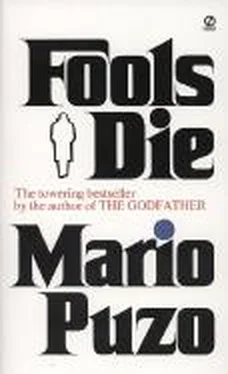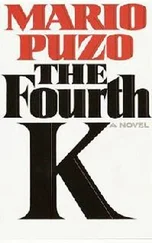Mario Puzo - Fools die
Здесь есть возможность читать онлайн «Mario Puzo - Fools die» весь текст электронной книги совершенно бесплатно (целиком полную версию без сокращений). В некоторых случаях можно слушать аудио, скачать через торрент в формате fb2 и присутствует краткое содержание. Жанр: Современная проза, на английском языке. Описание произведения, (предисловие) а так же отзывы посетителей доступны на портале библиотеки ЛибКат.
- Название:Fools die
- Автор:
- Жанр:
- Год:неизвестен
- ISBN:нет данных
- Рейтинг книги:3 / 5. Голосов: 1
-
Избранное:Добавить в избранное
- Отзывы:
-
Ваша оценка:
- 60
- 1
- 2
- 3
- 4
- 5
Fools die: краткое содержание, описание и аннотация
Предлагаем к чтению аннотацию, описание, краткое содержание или предисловие (зависит от того, что написал сам автор книги «Fools die»). Если вы не нашли необходимую информацию о книге — напишите в комментариях, мы постараемся отыскать её.
Fools die — читать онлайн бесплатно полную книгу (весь текст) целиком
Ниже представлен текст книги, разбитый по страницам. Система сохранения места последней прочитанной страницы, позволяет с удобством читать онлайн бесплатно книгу «Fools die», без необходимости каждый раз заново искать на чём Вы остановились. Поставьте закладку, и сможете в любой момент перейти на страницу, на которой закончили чтение.
Интервал:
Закладка:
But remember, these were the sharpest kids in America, the future business giants, judges, show business whizbangs. They didn’t take it lying down. One young guy, a partner in his father’s seat on the Wall Street Exchange, had his wife committed to a psychiatric clinic, then put in papers for a hardship discharge on the grounds that his wife had had a nervous breakdown. I forwarded the documents complete with official letters from doctors and the hospital. It didn’t work. Washington had received thousands of cases and taken a stand that nobody would get out on hardship. A letter came back saying the poor husband would be recalled to active duty and then the Red Cross would investigate his hardship claim. The Red Cross must have done a good job because a month afterward, when the guy’s unit was shipped to Fort Lee, Virginia, the wife with the nervous breakdown came into my office to apply for necessary papers to join him down at camp. She was cheerful and obviously in good health. In such good health that she hadn’t been able to go along with the charade and stay in the hospital. Or maybe the doctors wouldn’t go that far out on a limb to keep the deception going.
Mr. Hiller called me up about his son, Jeremy. I told him there was nothing I could do. He pressed me and pressed me, and I said jokingly that if his son was a homosexual, he might be discharged from the Army Reserve and not called to active duty. There was a long pause at the other end of the phone, and then he thanked me and hung up. Sure enough, two days later Jeremy Hiller came and filed the necessary papers to get out of the Army on grounds he was a homosexual. I told him that it would always be on his record. That sometime later in life he might regret having such an official record. I could see that he was reluctant, and then he finally said, “My father says it’s better than being killed in a war.”
I sent the papers through. They were returned from Governors Island, First Army HQ. After Pfc. Hiller was recalled, his case would be evaluated by a Regular Army board. Another strikeout.
I was surprised that Eli Hemsi had not given me a call. The clothing manufacturer’s son, Paul, had not even shown his face at the armory since the recall to active duty notices had been sent out. But that mystery was solved when I received papers through the mail from a doctor famous for his book publications on psychiatry. These documents certified that Paul Hemsi had received electric shock treatments for a nervous condition over the past three months and could not be recalled to active duty, it would be disastrous to his health. I looked up the pertinent Army regulation. Sure enough, Mr. Hemsi had found a way out of the Army. He must have been getting advice from people higher up than me. I forwarded the papers on to Governors Island. Sure enough, they finally came back. And with them special orders discharging Paul Hemsi from the United States Army Reserve. I wondered what that deal had cost Mr. Hemsi.
I tried to help everybody who put in for a hardship discharge. I made sure the documents got down to Governors Island HQ and made special calls to check up on them. In other words, I was as cooperative as I could be to all my clients. But Frank Alcore was the opposite.
Frank had been recalled with his unit to active duty. And he felt it a point of honor to go. He made no effort to get a hardship discharge, though with his wife and kids and his old parents he had a good case. And he had very little sympathy for anybody in his units trying to get out of the one-year recall. As chief administrative officer of his battalion, both as a civilian and the battalion sergeant major, he sat on all the requests for hardship discharge. He made it as tough as he could for all of them. None of his men beat the recall to active duty, not even those who had legitimate grounds. And a lot of those guys he sat on were guys who had paid him top dollar to buy their enlistment in the six months’ program. By the time Frank and his units left the armory and shipped to Fort Lee there was a lot of bad blood.
I got kidded about not having been caught in the Army Reserve program, that I must have known something. But with that kidding there was respect. I had been the only guy in the armory not to have been sucked in by the easy money and the absence of danger. I was sort of proud of myself. I had really thought it all out years ago. The monetary rewards were not enough to make up for the small percentage of danger involved. The odds were a thousand to one against being called to active duty, but I had still resisted. Or maybe I could see into the future. The irony was that a lot of WWII soldiers had been caught in the trap. And they couldn’t believe it. Here they were, guys who had fought three or four years in the old war and now back in green fatigues. True, most of the old-timers would never see combat or be in danger, but still, they were pissed off. It didn’t seem fair. Only Frank Alcore didn’t seem to mind. “I took the gravy,” he said. “Now I have to pay for it.” He smiled at me. “Merlyn, I always thought you were a dummy, but you look pretty smart right now.”
At the end of the month, when everybody shipped out, I bought Frank a present. It was a wristwatch with all kinds of shit on it to show compass directions and time of day. Absolutely shockproof. It cost me two hundred bucks, but I really liked Frank. And I guess I felt a little guilty because he was going and I wasn’t. He was touched by the gift and gave me an affectionate half hug. “You can always hock it when your luck is running bad,” I said. And we both laughed.
For the next two months the armory was strangely empty and quiet. Half the units had gone on active duty in the recall program. The six months’ program was dead; didn’t look like such a good deal anymore. I was out of business, as far as my racket was concerned. There was nothing to do, so I worked on my novel at the office. The major was out a lot, and so was the Regular Army sergeant. And with Frank on active duty I was in the office all alone most of the time. On one of these days a young guy came in and sat at my desk. I asked him what I could do for him. He asked me if I remembered him. I did, vaguely, and then he said his name, Murray Nadelson. “You took care of me as a favor. My wife had cancer.”
And then I remembered the scene. It had happened almost two years ago. One of my happy clients had arranged for me to meet with Murray Nadelson. The three of us had lunch together. The client was a sharp shooting Wasp Wall Street broker named Buddy Stove. A very soft-selling super salesman. And he had told me the problem. Murray Nadelson’s wife had cancer. Her treatment was expensive, and Murray couldn’t afford to pay his way into the Army Reserve. Also, he was scared to death of getting inducted for two years and being shipped overseas. I asked why he didn’t apply for a hardship deferment based on his wife’s health. He had tried that, and it had been refused.
That didn’t sound right, but I let it pass. Buddy Stove explained that one of the big attractions of the six months’ active-duty program was that the duty would be done in the States and Murray Nadelson could have his wife come down to live outside what ever training base he would be shipped to. After his six months they also wanted the deal where he would be transferred to the control group so that he wouldn’t have to come to meetings. He really had to be with his wife as much as possible.
I nodded my head. OK, I could do it. Then Buddy Stove threw the curveball. He wanted all of it done for free. No charge. His friend Murray couldn’t spend a penny.
Meanwhile, Murray couldn’t look me in the eye. He kept his head down. I figured it was a hustle except that I couldn’t imagine anybody laying that hex on his wife, saying that she had cancer, just to get out of paying some money. And then I had a vision. What if this whole thing blew up someday and the papers printed that I made a guy whose wife had cancer pay a bribe to take care of him? I would look like the worst villain in the world, even to myself. So I said, sure, OK, and said something to Murray about I hoped his wife would be OK. And that ended the lunch.
Читать дальшеИнтервал:
Закладка:
Похожие книги на «Fools die»
Представляем Вашему вниманию похожие книги на «Fools die» списком для выбора. Мы отобрали схожую по названию и смыслу литературу в надежде предоставить читателям больше вариантов отыскать новые, интересные, ещё непрочитанные произведения.
Обсуждение, отзывы о книге «Fools die» и просто собственные мнения читателей. Оставьте ваши комментарии, напишите, что Вы думаете о произведении, его смысле или главных героях. Укажите что конкретно понравилось, а что нет, и почему Вы так считаете.












